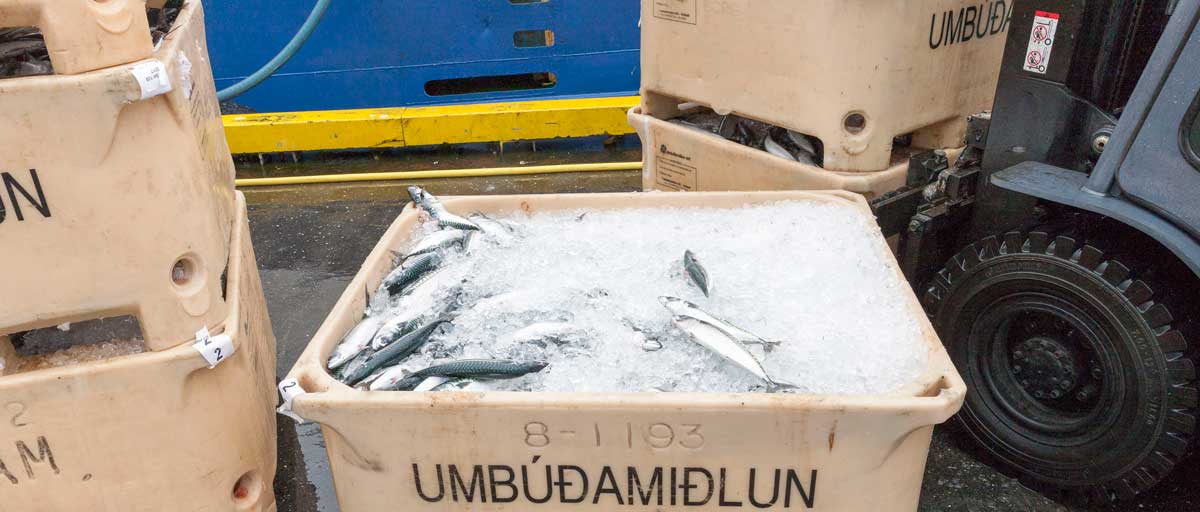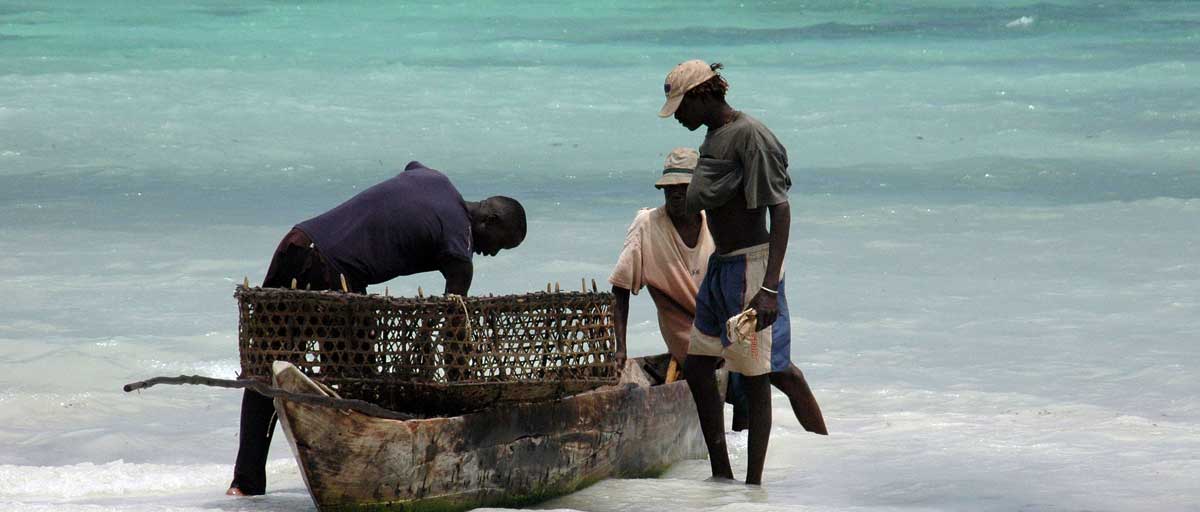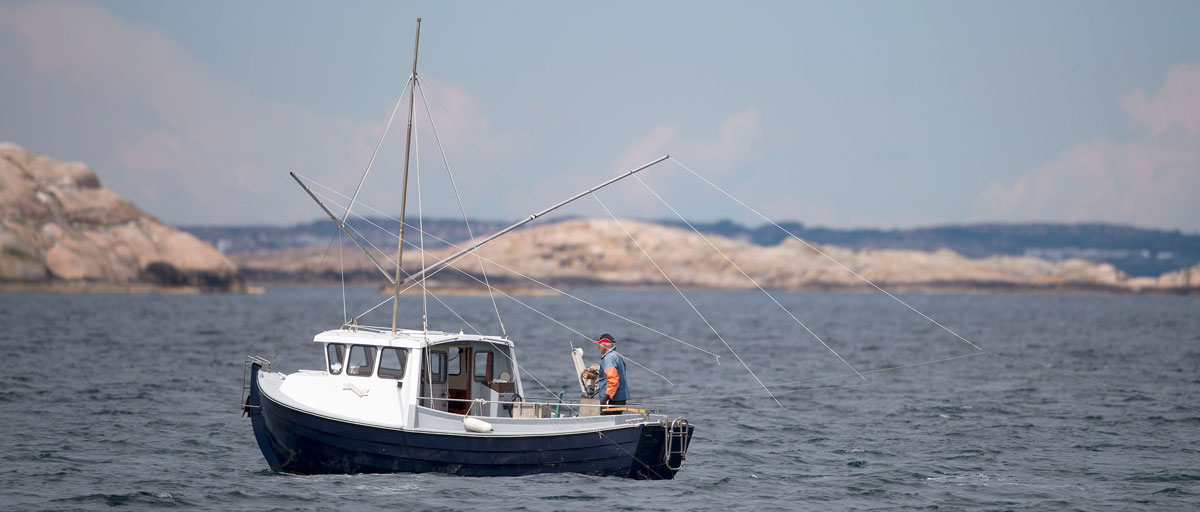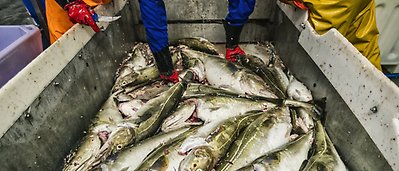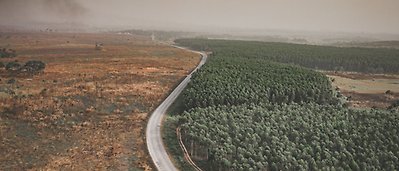Bildtext får vara max två rader text. Hela texten ska högerjusteras om den bara ska innehålla fotobyline! Photo: B. Christensen/Azote
FISHERIES GOVERNANCE
Holy mackerel, what a food fight!
New study examines how a change in migration patterns of the northeast Atlantic mackerel led to intergovernmental dispute
- Case study examines the dispute around the northeast Atlantic mackerel stock quotas between the EU, Norway, Iceland, and Denmark (for Faroe Islands and Greenland)
- Study aims to understand how institutions, power, and knowledge; influence social conflict resulting from an environmental change
- Case study suggests that power shapes knowledge, and institutions influence the use of power
People fighting over who gets what of our planet is nothing new. Human history is rife with land disputes, mineral wars, water clashes, and battles over food. The Anthropocene might bring us more of this, with environmental change becoming more volatile and abrupt.
Despite the reoccurrence natural resources conflicts, environmental change and social conflict is anything but straightforward. In a paper recently published in Regional Environmental Change centre PhD candidate Jessica Spijkers and associate professor Wijnand Boonstra attempt to open what they call “the black box of factors” that influences the cause and effect of environmental change to social conflict.
Using a case of the northeast Atlantic mackerel dispute which started in 2007, Spijkers and Boonstra examine which social mechanism caused this notorious dispute to unfold.
The dispute: Who’s in and who’s out?
Fish stocks in the north Atlantic are managed by a two-tier process, but for now it is only important to consider the “Coastal States.” Coastal States negotiate the division of fish stocks that enter their coastal 200-mile exclusive economic zone (EEZ). First, they decide on the total catch of a particular species. Second, they negotiate what amount of catch each Coastal State is entitled to that year.
Originally, Coastal States that decided on the mackerel stock quota were comprised of Norway, the EU, and Faroe Islands.
Atlantic mackerel are a migratory species, and reside in a number of different waters throughout its life cycle. However, in recent decades the mackerel’s migratory behaviour started to change, likely influenced by changing climate and ocean temperatures. This moved the mackerel stock further north into Icelandic and Greenlandic waters. As mackerel were typically not found in these waters, Iceland and Greenland were not considered Coastal States, and therefore did not have rights to receive part of the mackerel quota.
In 2007, Icelanders started fishing mackerel in their own waters. This was a point of tension for EU and Norwegian fishers whom believed that mackerel exclusively belonged to their quotas. However, their reluctance to revisit “total allowable catch” mackerel quotas fueled Iceland’s discontent with the EU and Norway.
As Spijkers highlights, “The change in geographical distribution resulted in a spatial mismatch, the failure to cover relevant geographical areas and include all relevant stakeholders.” With the exclusion of Iceland and its fisheries from the agreement, not all relevant Coastal States are included in management plans. The mismatch resulted in overfishing of the northeast Atlantic mackerel, and eroded the legitimacy and functioning of existing management plans.
The change in geographical distribution resulted in a spatial mismatch, the failure to cover relevant geographical areas and include all relevant stakeholders.
Jessica Spijkers, lead author
Power shapes knowledge, and institutional failure creates power
To understand the origin and development of the mackerel dispute, Spijkers and Boonstra examined the relations between institutions, power, and knowledge”. Using a method called “process tracing” the researchers analysed how these three factors produced and influenced the mackerel dispute. Through their analysis, Spijkers and Boonstra were able to identify two mechanisms that helped drive the dispute.
First, they found that power shapes knowledge. Armed with various surveys and analyses, the EU, Norwegian, and Icelandic governments took aim at each other. According to Icelandic research, mackerel had permanently shifted their migration patterns to Icelandic waters. Norway and the EU disagreed, presenting research arguing that the shift was only temporary. In this research clash, Norway questioned the validity of Iceland’s results, and on both sides results most favourable to their respective causes were selected to promote their agendas.
Second, they found that vague legislation creates room for strategic interpretation. As a result, Coastal States’ use of existing vague legislation creates an opportunity to exercise power over newcomers through bargaining and pressuring. More specifically, the EU and Norway’s use of legislation allowed them to exclude Iceland from the mackerel bargaining table.
Resolving or deepening the conflict?
While many other conflict studies have examined disputes among resource access and use, few have looked at non-violent conflicts between high-income countries as Spijkers and Boonstra have done.
Based on their analysis, the authors conclude that the mackerel dispute is currently undergoing a rebalancing of power which can go two ways. As Spijkers concludes, “One outcome could be the states recognize the need to collaborate and give responsibility for a fair distribution to an independent governing body.”
Alternatively, she says, they fail to recognize their interdependence, fail to cooperate, and the political deadlock hardens. Not surprisingly, the latter scenario is bad news for a sustainable future for the mackerel. Unfortunately, there are signs that this scenario is currently unfolding.
Methodology
When you know an outcome, but want to investigate how it came about, the method process tracing can help to identify causal mechanisms that influenced the outcome. More specifically, process tracing aims to identify causal variables between independent variables and the outcome of the dependent variable. To use process tracing, causal mechanisms must be identified that appear relevant to the outcome.
In this case, the causal mechanisms are: power, institutions, and knowledge. These are identified as relevant variables, because they are often cited in literature that deals with social action and environmental change. The outcome is the mackerel dispute. The study used a type of process tracing, explaining outcome process tracing, which aims to identify historical outcomes.
To gather data, the researchers carried out semi-structured interviews with politicians, civil servants, scientists, and industry stakeholders from the Coastal States and ICES. Open-ended questions aimed to understand the historical development of the changes in the Atlantic mackerel stock distribution that occurred from 2007-2014.
Spijkers, J. & Boonstra, W.J. 2017. Environmental change and social conflict: The northeast Atlantic mackerel dispute. Reg Environ Change, doi:10.1007/s10113-017-1150-4

Jessica Spijkers is PhD student enrolled at the Stockholm Resilience Centre and James Cook University's ARC Centre of Excellence for Coral Reef Studies. Her work focuses on international conflict around shared governance of fish stocks.
Wijnand Boonstra is an Associate Professor who investigates the social dynamics of primary resource use, and its impact on the sustainability of sea- and landscapes.
